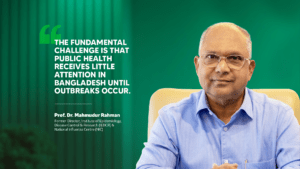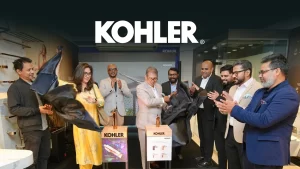1. Let’s start with your academic journey—pursuing your education at the University of Cambridge. What was that experience like, and how did it shape or influence your path into the world of politics?
My time at Cambridge was an incredible experience. It provided me with a unique opportunity to engage with global leaders and thinkers, attend talks, and meet individuals who later became ministers and mayors. I had the privilege of attending lectures by renowned figures such as Fazle Hasan Abed, and during my time abroad, Professor Muhammad Yunus received the Nobel Prize, which was a proud moment for Bangladesh.
At Cambridge, learning extended far beyond the classroom. I was actively involved in extracurricular activities, particularly within Cambridge Societies, where I served as an elected member in various bodies. The exposure to policy-making, along with interactions with people from diverse disciplines and cultures, was truly transformative.
In 2009, BBC produced a short documentary about my journey, recognizing me as one of the highest-achieving Bangladeshis, which was an emotional milestone. Cambridge played a crucial role in shaping my outlook and inspired me to pursue a career in politics with a strong focus on public policy.
My MPhil in Modern South Asian Studies centered on the history and politics of Bangladesh and the subcontinent, with a particular emphasis on policy-making. My thesis explored technological integration in government policy-making in South Asia, using India as a case study, and I had the opportunity to interact closely with leading thinkers shaping the region’s future.
In 2011, during my second year at Cambridge, I began working with Mr. Tarique Rahman, our Acting Chairman, on policy-making initiatives, particularly in the education sector. This was an extraordinary opportunity, as I had always been passionate about developing pragmatic, sustainable policies. My first project focused on drafting policies for vocational and technical education, aiming to create an educational revolution in Bangladesh. With Bangladesh’s large demographic dividend of young people, the objective was clear: to harness their talent and train them to become skilled professionals who could contribute both domestically and internationally.



2. Looking back on your political journey so far, what have been some of the most significant and cherished moments that stand out to you, whether in terms of personal growth, impactful decisions, or milestones that have shaped your role within the party and the broader political landscape of Bangladesh?
The opportunity to work with Mr. Tarique Rahman—one of the most prominent figures in Bangladesh—was truly a once-in-a-lifetime experience. Working closely with him allowed me to deeply understand his vision for the country. He generously shared his ideas across every sector, emphasizing inclusive development that transcends politics and respects individuals regardless of ideology, belief, or religion.
Our journey began with education and gradually expanded into areas such as technology, agriculture, environment, urbanization, energy, and industrialization. I had the privilege of engaging directly with his thoughts and translating them into policy ideas. Our focus was on integrating global best practices—understanding how other countries, including countries of comparison & proximity, addressed similar challenges—and applying those lessons in a contextually relevant way for Bangladesh.
It was a powerful convergence of visionary leadership and practical, experience-based policymaking, grounded in Mr. Tarique Rahman’s decades of political insight. I was deeply impressed by the depth and breadth of his vision for social development across all sectors.
These experiences have not only shaped my understanding of national development but also reinforced my belief that sustainable progress must be inclusive, forward-looking, and rooted in practical, implementable strategies.

3. How do you view the young generation’s increasing involvement in political discourse and activism in Bangladesh, especially in recent times, considering the noticeable rise in youth engagement in politics?
Youth have always played a pivotal role in shaping Bangladesh’s history, from the Liberation War to every major pro-democracy movement. Every time authoritarian regimes have violated human rights and suppressed freedom of expression, it has been the youth who have risen to defend fundamental values — a spirit we witnessed again during the July uprising.
As a major political party, BNP has consistently focused on empowering and involving youth in policymaking. Bangladesh Jatiyotabadi Chatrodal, the largest youth organization in the country, remains central to this effort. Our Acting Chairman, Mr. Tarique Rahman, has been deeply committed to engaging with youth — both within and outside the party — through a series of public and private discussions.
BNP has long been a voice for progressive change. A notable example is Mr. Tarique Rahman’s early advocacy in 2014 to abolish the outdated quota system — a move that addressed a pressing societal issue long before it became a national demand.
As a party, we are committed to nation-building through policies that create jobs, educate and train youth, and equip them with the right skills and competencies. We aim to foster entrepreneurship and enable young people to become active contributors to the economy, understanding and embracing their aspirations.
This spirit of youth empowerment is at the heart of BNP’s vision for a stronger, more inclusive Bangladesh. If Bangladesh is to succeed in the coming decades, it must be through the leadership, energy, and innovation of its youth — and that remains a core principle guiding our movement forward.



4. How can youth contribute to national development and democratic progress beyond formal politics?
The country will only benefit when more youth take on diverse roles in politics. Their involvement strengthens political accountability and drives greater transparency across both government and opposition. Whether it’s through media, human rights, or other professions, as long as the values and democratic principles align, we should all work together—regardless of any divisions—for the betterment of the nation.
The more youth who actively join politics, the stronger the country becomes. However, participation doesn’t need to be confined to formal political roles. Individuals from any professional background who carry democratic values and a patriotic spirit can contribute meaningfully to building a fair, equitable, and inclusive society.

5. In today’s world, narratives influence perceptions more than ever before. With the rise of individuals with significant reach, public opinion is now being shaped more strongly. How do you perceive this shift in the way narratives are being formed and consumed?
First and foremost, we need accurate and reliable news. Misinformation and propaganda—often driven by personal or political motives—have become widespread. However, such distorted narratives are not sustainable in the long term. Building a culture of objectivity, fact-based reporting, and responsible use of social media is essential for national progress.
While the influence of digital platforms is undeniable, we must recognize that a large portion of Bangladesh—especially in rural areas—still lacks consistent access to information technology. There is a Bangladesh beyond Dhaka, and we must ensure that narratives reflect the full spectrum of our society.
True national narratives must be inclusive—representing not only the urban class and professional communities but also farmers, laborers, small entrepreneurs, and rural citizens. Only by listening to both urban and grassroots voices we can build an honest, unified national conversation that drives meaningful change for all.



6. For perhaps the first time in Bangladesh, social media has emerged as a powerful space where citizens are voicing their opinions during elections. How do you view this new era of digital democracy and its impact on the electoral process?
Digital campaigning will undoubtedly play an increasingly important role in Bangladesh’s political future. However, we must also recognize its limitations. A significant portion of the population—particularly in rural constituencies—still lacks stable internet access, and in some areas, online presence is virtually nonexistent.
Our campaign strategy must therefore be multifaceted. Traditional grassroots methods of reaching voters remain essential, and must work in tandem with digital tools. While social media and online platforms are powerful—especially among urban populations, civil society, and professionals—they must be viewed as part of a broader engagement ecosystem.
One of the key reasons for uneven development in Bangladesh is the absence of basic infrastructure, including reliable internet connectivity. For many citizens, platforms like Facebook, Twitter, or YouTube remain inaccessible. Until internet access becomes a basic right for all, we must ensure that both online and offline strategies are equally prioritized to create truly inclusive political participation.

7. As someone at the intersection of global exposure and local politics, how do you strike a balance between modern democratic ideals and the grassroots realities of Bangladesh?
Having been born and raised in Dhaka, my early perspective was naturally shaped by urban realities. However, over a six-month period, I had the opportunity to travel to nearly 40 districts across the country—and that experience was profoundly eye-opening. What we see from Dhaka often doesn’t reflect the diverse realities on the ground.
Challenges and expectations vary significantly across regions. In the capital, concerns like price inflation may dominate. In rural areas, farmers are struggling to get fair prices for their produce. These are structural, ecosystem-level issues that require localized, practical solutions.
This disparity is also evident in the education sector. In cities, conversations may revolve around teacher quality or classroom facilities. But in many rural schools, students often lack basic infrastructure, including proper classrooms or benches. While both are important, the problems—and therefore the solutions—are different.
This is why we believe in people-centric connectivity. As a political party, BNP consistently engages with citizens at every level, listens to their concerns, and works to develop inclusive, context-sensitive, and sustainable policies that reflect both modern ideals and local realities.



8. As a political leader, how has your experience been managing and interacting with members from different districts? How do you motivate and influence them to stay engaged in their work?
Nothing builds trust like being personal and present. When central party leaders visit a remote village—it leaves a deep impression. I’ve seen firsthand how local members wait for days, even weeks, just to meet us. Their sincerity and warmth are truly humbling.
As a leader, you must lead with empathy, value each person’s effort, and connect from the heart. That personal attachment matters. One of BNP’s greatest strengths is its deep, structured presence across the country—from the union to the upazila level—which makes such meaningful engagement possible.
Politics is not a profession; it is a commitment. Understanding people’s problems, emotions, and expectations—and treating them as your own—creates a lasting bond. That connection is what keeps motivation alive, and it reflects the spirit of BNP’s grassroots-driven leadership.

9. As the election approaches, how is BNP planning for the upcoming election? What are the key areas that the party is focusing on the most to ensure a strong campaign?
Our campaign strategy is anchored on three core priorities:
First, government accountability. Political manifestos must go beyond promises—they must be realistic, measurable, and actionable. Our manifesto outlines clear deliverables for the first 100, 180, and 360 days. Most importantly, we are committed to establishing a transparent system where citizens can hold us accountable for every commitment we make.
Second, upholding democratic values. It is essential to break the cycle of political vengeance and create a culture where human rights, the rule of law, and freedom of expression are genuinely respected. These are non-negotiables for a truly democratic society.
Third, inclusive development. True development must reach every individual—regardless of geography, religion, ideology, or economic class. Development isn’t just about numbers; it’s about real solutions that improve daily lives, reduce disparities, and ensure fairness.
These three pillars—accountability, democratic principles, and inclusive development—are at the heart of BNP’s vision for a reformed, united, and forward-moving Bangladesh.



10. Share your future goals as an adviser and political leader. How do you envision your role in shaping the future of Bangladesh?
I hope to contribute—within my capacity—by shaping policies that deliver long-term, measurable impact. Politics is perhaps the only profession where one can directly influence the lives of millions. That responsibility is something I take very seriously.
If I can help design even five transformative policies—policies that generate employment, address the challenges of youth, support the growth of SMEs, attract meaningful foreign direct investment (FDI), and create an ecosystem where industries can thrive through sound fiscal and operational frameworks—that would be deeply fulfilling.
My vision is to pursue this political journey through policy-making: integrating global best practices while adapting them to our cultural context, institutional realities, and national priorities. Always with one goal in mind: delivering practical, people-centered outcomes for the betterment of Bangladesh.

11. Who is Mahdi Amin beyond politics? What are the things you enjoy doing in your free time?
I deeply value spending time with my family, especially with my children—though balancing that with work has become increasingly challenging. I used to enjoy outdoor sports, particularly football and cricket. These days, I love playing football with my 7-year-old son whenever I get the chance.
During my student life in the UK, I often relaxed by watching classic series like Friends or The Big Bang Theory—usually over a simple meal. Even now, those small, everyday moments bring a sense of comfort and balance amidst a demanding schedule.



12. What message would you like to share with those aspiring to pursue a career in politics or play a role in making an impactful contribution to society?
It’s always a combination of nature and nurture. As you engage with people and take on different responsibilities, you learn by doing—and over time, those experiences shape who you become. One of the most important pieces of advice I can offer is to be true to yourself. Many young people today chase shortcuts, like trying to go viral. But lasting relevance comes from consistency, substance, and sincerity.
You must understand your core values. If you believe in democracy, then you must hold onto integrity and stay committed to your principles—even when it’s difficult. Equally important is having a clear vision of who you want to become and the path you plan to take to get there.
- Today’s political landscape offers many options. Some may choose to join established parties, others might build new platforms or movements. There’s no single path—but whatever route you take, the objective must always be national service.
Politics is unlike any other profession. It’s not about fame or wealth. If that becomes the goal, it won’t be sustainable. We must remember the sacrifices made by those who gave their lives for this country—not for recognition, but to bring real change. Honoring that legacy is our collective responsibility. And if we stay grounded in that purpose, we can contribute to something truly meaningful.






